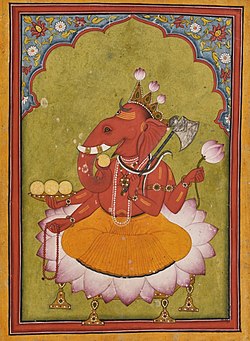Ganpati
| Ganesha | |
|---|---|
|
|

|
|
| Devanagari | गणेश |
| Sanskrit transliteration | Gaṇeśa |
| Affiliation | Deva |
| Mantra | Oṃ Gaṇeśāya Namaḥ, Oṃ Gan Gaṇapatayē Namaḥ |
| Weapon | Paraśu (axe), pāśa (noose), aṅkuśa (elephant goad) |
| Symbols | Aum, Modak |
| Consort | |
| Parents | Shiva and Parvati |
| Siblings | Kartikeya |
| Mount | Mouse |
| Texts | Ganesha Purana, Mudgala Purana, Ganapati Atharvashirsa |
| Festivals | Ganesh Chaturthi |
Ganesha (/ɡəˈneɪʃə/; Sanskrit: गणेश, Gaṇeśa; ![]() listen ), also known as Ganapati and Vinayaka, is one of the best-known and most worshipped deities in the Hindu pantheon. His image is found throughout India, Sri Lanka, Thailand and Nepal.Hindu sects worship him regardless of affiliations. Devotion to Ganesha is widely diffused and extends to Jains and Buddhists.
listen ), also known as Ganapati and Vinayaka, is one of the best-known and most worshipped deities in the Hindu pantheon. His image is found throughout India, Sri Lanka, Thailand and Nepal.Hindu sects worship him regardless of affiliations. Devotion to Ganesha is widely diffused and extends to Jains and Buddhists.
Although he is known by many attributes, Ganesha's elephant head makes him easy to identify. Ganesha is widely revered as the remover of obstacles, the patron of arts and sciences and the deva of intellect and wisdom. As the god of beginnings, he is honoured at the start of rituals and ceremonies. Ganesha is also invoked as patron of letters and learning during writing sessions. Several texts relate mythological anecdotes associated with his birth and exploits and explain his distinct iconography.
...
Wikipedia
